- Home
- Greg Keyes
The Infernal City Page 16
The Infernal City Read online
Page 16
Attrebus heard a shuffle behind him, and a glance showed him what he should have known—there were two more riders behind him.
“We’ve no need to go to Rimmen,” Sul replied.
“Rude,” the woman said. “Where are my manners? Would you ride with us? Accept our protection?”
“We would be honored,” Sul replied.
“Now wait a moment—” Attrebus began.
“The whelp is speaking out of turn,” Sul cut in. “We would be honored. I had no idea the East was so fretful. And of course, we offer Je’m’ath in return for your kindness.”
“Ah,” the woman said. “You also have manners, outlander. Very well. Travel with my brothers and cousins and me. We are happy to share what we have.”
And with that, they turned their mounts and rode east.
The trail soon debouched into a broad wash, a stream only inches deep but several yards across. Olive, tamarisk, and palm traced its outline, and beyond it three large tents had been pitched.
The air buzzed with metallic-looking dragonflies.
They’ve been waiting here, Attrebus thought. For us, or someone like us.
To him, that didn’t bode well, but Sul seemed pretty relaxed about the whole situation. Did he imagine he could kill all of the Khajiit, if it came down to it?
It seemed possible. He remembered Sul’s philosophy about fighting. Maybe he was just biding his time.
“Come,” the woman said. “Let’s have cake.”
The tents were set up facing a small circle of stones within which ashes faintly smoked. They were ushered to sit, and when they complied, all of the Khajiit that accompanied them joined them. Even the tigerlike mounts folded themselves down next to their riders.
From the tents, Attrebus heard excited mewing and talking, and several very small kittenish faces poked out of one of the flaps and were just as quickly drawn back in.
After a moment what seemed to Attrebus to be a very old female came out, bearing a tray of small, round cakes, a bowl, and a narrow-necked bottle of rose-colored glass.
She knelt in front of Sul, placed a small cloth on the ground, then a cake on the cloth. With a precise movement of her hand, she pinched some sort of powder from a small bowl in the tray and sprinkled it on the cake. Then she took the bottle and let exactly four drops of golden liquid drip on it.
She moved to him, and then each of the Khajiit in turn, repeating the ritual gesture for gesture.
“Now we’ll tell our names,” the merish-looking woman said.
This near, she seemed even more beautiful and exotic than she had at a distance, and he noticed with a bit of surprise that the marks on her face were tattoos, rather than natural. Maybe she wasn’t a cat after all.
“I am Lesspa,” she said. “Our clan is F’aashe.” She motioned with her knuckles toward the Khajiit to her left. “She is M’kai, my sister. There is Taaj, my maternal cousin. There is Sha’jal, my brother …”
Attrebus blinked. She seemed to be indicating one of the mounts.
He remembered something now, from his lessons as a boy—or was it the story his nurse had told him, about the four Khajiit and the riding kite?
He didn’t know anything about these people at all, did he?
She finished naming everyone. Then he and Sul gave their names—he called himself simply “Treb”—and they all lifted the cakes.
“Touch it to your mouth, but do not eat,” Sul said as Attrebus opened his mouth. “That will satisfy the spirit of the ceremony. Khajiit food can be dangerous for us.”
Lesspa nodded knowingly, but did not add anything.
So Attrebus watched the Khajiit first lick and then devour the sweets, while his belly growled.
After that, the rest of the camp turned out—another eight adults and about twelve children of various ages. They quickened the fire and set about making a stew of some sort.
“Can I eat that?” he asked Sul.
“If you want. I’m pretty sure it’s honey and date soup. The cakes had moon-sugar in them. It’s a drug, the same stuff they make skooma out of.”
“They don’t seem to be feeling any ill effects,” Attrebus said.
“Because they’re Khajiit—they eat the stuff every day, in one form or the other—and they’re more naturally tolerant of it. Built different from you. Doesn’t help them with skooma, though—there are plenty of Khajiit addicts.”
“Lesspa doesn’t look like she’s all that different from us.”
Sul snorted. “Some used to think that the Khajiit were another variety of mer. But it’s the moons—the phases they’re in when the kits are born determines how they turn out.”
“So the mount—that really is her brother? They had the same parents?”
“Yes. But I’d stay away from that subject, if I were you. It’s too easy to say the wrong thing.”
Attrebus nodded, feeling stupid. Sul seemed to know everything, and he was starting to feel as if he knew very little. Whenever he went someplace he hadn’t been, he always received a briefing about it. That had always been enough—it hadn’t occurred to him to learn much about any place he had no business with. It made him wonder what important things he didn’t know about Black Marsh.
But what really nagged him was that he had known Khajiit, been practically brothers with them. And yet he hadn’t been aware of the most fundamental facts of their existence.
He tried to remember conversations he might have had with the cats in his guard, and realized he couldn’t remember any that went on for more than a few sentences.
So maybe they hadn’t been his friends. Maybe he really hadn’t known most of his guard that well.
Which led him back to the festering question: Was Sul right about everything?
This depressing train of thought was interrupted by Lesspa returning her attention to them. She folded lithely down into a squat that looked as if it ought to hurt but clearly didn’t.
“Now,” she said, “we discuss Je’m’ath.”
“Very well,” Sul replied. “How can we help you?”
“Moon-sugar is scarce here, but plentiful in Rimmen. But the new potentate there forbids our clans inside the walls, and will not sell us sugar. You’re not Khajiit. You go into Rimmen, get the sugar.”
“Why won’t he sell you sugar?”
“Doesn’t like the free clans. He’s outlawed us on our own land. Khajiit that work in the walls have all they want, but we won’t live like that, yes? We won’t.”
“That sounds reasonable,” Sul said. “But our path takes us beyond Rimmen, to the border.”
“Ours turns back from here.”
Sul nodded thoughtfully. “Very well.”
“Wait a minute,” Attrebus said.
“No,” Sul said. “You don’t understand this.”
“I’m starting to. You promise not to kill us if we help you get moon-sugar?”
“We protect you,” Lesspa said.
“Yes, you protect us from you.”
“You meet us first,” Lesspa said. “That’s good for you. There is no order in the North. Bandits, killers, prey even on weak Khajiit, and your kind is very unpopular on these plains. Miles to Rimmen. Many more to the border. We help you survive, you help us.”
“What if we say no? You’ll kill us?”
“No. We ate cake with you. Maybe kill you next time, but not now. Still, you’ll die soon enough without us.”
Attrebus looked at Sul. “Is she right?”
“Probably. The last time I was here, this was all still in the Empire and pacified. Things have changed.”
“Pacified,” Lesspa said. “Yes. Not now. All is wild. The mane was assassinated, you know? There is war in the South. Here, just chaos and potentate.”
“Look,” Attrebus said, trying to force a little gravity into his voice. “What Sul and I are doing is very important. Something very, very bad is happening in Black Marsh, something that could destroy us all. You should be proud to help us. There would be
much honor in that.”
“We will help you. And you will give us Je’m’ath. Then you will go find this bad thing, and we will go west.”
“Agreed,” Sul snapped before Attrebus could say anything else.
Annaïg didn’t reply that night, but he didn’t let it concern him. Likely she was just asleep or busy. He went to sleep still sour over the bargain Sul had made and annoyed that Lesspa naturally assumed the Dunmer was the leader.
The next day he had to grudgingly admit things might have worked out for the best. Twice before noon they met other bands of Khajiit who plainly wanted to kill Sul and him. The first bunch offered to buy them, and the second actually had to be backed down by a show of force.
They left the badlands and entered a ragged steppe of thorn-scrub. It lifted and rolled in long undulations. Two days on that and finally, over a distant hill they could see a golden gleam.
“Rimmen,” Lesspa said. “We dare go no nearer.”
“That’s still a long way,” Sul said. “What’s between here and there?”
“Rimmen’s patrols. Traders. Not so dangerous for you in there, but dangerous for us.” She handed him a plain leather bag. “Get a good deal.”
And so they left Lesspa and her clan and continued on toward Rimmen.
“This is a waste of time,” Attrebus complained. “We’re going to lose a day.”
“No we aren’t,” Sul said. “We’re just going to ride on to the border. We’ve no business in Rimmen.”
At first Attrebus wasn’t sure he’d heard right.
“But you took their oath,” he protested when it sank in. “Bound us to do it. We have their money!”
“Which I’m sure will be of use to us.”
“But they kept their end of the bargain,” Attrebus said. “We can’t—”
“We can,” Sul replied. “I’ve broken much deeper oaths than this. I survived it. This is not only a waste of time, it’s dangerous. We’ll be breaking the law, supplying them with contraband.”
“The law doesn’t sound fair,” Attrebus said.
“Fair? What do you even mean by that? No law is fair to everyone. A law against stealing is unfair to thieves. The thing to think about is whether you’ll be able to save your precious Annaïg if you’re clapped in a dungeon or beheaded.”
And something burst in Attrebus.
“What can I do anyway?” he shouted. “You say I’m not a tenth the man I think I am, right? So what are we going to do, the two of us, against this thing? With me being so useless and all?”
To his horror, he heard his voice crack and realized he was starting to cry.
“Here we go,” Sul said.
“What do you care anyway? I can’t imagine you care if Umbriel kills everyone.”
“That’s right, I don’t,” Sul admitted.
“But—then why? Why are you bothering, if you don’t care?”
Sul glared at him, and Attrebus suddenly saw something in those terrible eyes he hadn’t seen before: pain.
“I loved someone,” Sul snarled. “She was murdered. My homeland was destroyed, my people decimated and scattered to the winds. I lost everything. Those responsible for that must pay, and one of them is on Umbriel. Is that simple enough for you?”
His speech struck Attrebus dumb for a moment. Not so much the words as the tone, the sheer tortured flatness of Sul’s voice.
“I’m sorry,” he finally said.
“Just ride,” Sul snapped.
But he couldn’t let it go. “You mean to say that you were there when the Red Mountain exploded? You know what happened?”
Sul didn’t answer.
“It must be terrible. I can’t imagine—”
“Please, for the favor of Mephala don’t tell me what you can and can’t imagine. Just do what I say.”
His tone was still odd, and Attrebus still didn’t exactly trust the man. But he was starting to believe him, at least as far as Umbriel was concerned. And in other things.
He took a deep breath. “It’s true, isn’t it? What Radhasa said about me?”
“Oh, thank the gods,” Sul intoned, “we’re back to you again. Are you still worried about the shame? About everyone knowing but you?”
“Wouldn’t you be?”
“But they don’t,” Sul said, his voice softening a bit. “Most people in the world don’t know you’re a fraud.”
“My father, my mother, most of the court—they all must have been sniggering behind my back.”
“So what? More people believe in you than don’t.”
“They believe in a lie. You just said it.”
“Then become the truth, you idiot. Become what they think you are.”
Attrebus let that sink in for a moment.
“You think that’s possible?”
“I don’t know. But we can find out.”
“You’ll help me?”
“I suppose I must,” Sul sighed.
“Why?”
“You said it yourself—it’s just the two of us. We have to get to Morrowind, and we have to get there before Umbriel.”
“Why? What’s in Morrowind? How do you know Umbriel is going there?”
“It is, just trust me. And we’ll never beat it on foot or horseback. I think I might know the way, but we’ll need to make it to the Niben Valley first. And it would be helpful to have allies. The legendary Prince Attrebus ought to be able to drum up a few.”
Attrebus thought that over and found that it made some sense. “Thank you,” he finally said.
Sul nodded reluctantly.
“But here’s the thing …” Attrebus continued.
“What now?”
“Prince Attrebus wouldn’t take Lesspa’s money and betray his oath. He’d get the moon-sugar and bring it back to her.”
For a long moment Sul didn’t say anything, but then his shoulders seemed to relax slightly.
“Right,” he said.
Rimmen had elegant bones of ivory-colored stone with few towers but many domes. Soldiers—human soldiers—met them at the gate, searched them, questioned them, and eventually passed them through. For another hundred yards they snaked through the twists and turns of an entry overlooked by platforms for archers, mages, and siege weapons. That brought them to the market, a bustling, colorful plaza empty in the middle but girdled by tents and stalls and bounded by canals. A broad avenue flanked by even more expansive waterways continued on to what was clearly the palace, an ancient-looking structure raised up on a high, tiered stone substructure. The tiers held some buildings, and apparently earth, because he could see trees growing there. Surmounting that was a cylindrical building with a large golden dome. Water cascaded down the sides of the palace, feeding the pool that encircled it.
Attrebus wondered where all of the water came from.
Off to the eastern side of the palace, he could see the odd curly-edged roof of what had to be the Akaviri temple Annaïg had mentioned. The only place he’d ever seen with similar architecture was Cloud Ruler Temple, which he had viewed from a distance when he was ten, hunting with his father’s traveling court in the mountains north of Bruma. He remembered that trip with fondness—he’d killed his first bear.
Or maybe he hadn’t, now that he thought of it. It had been moving a little strangely when he saw it, hadn’t it? Had it already been wounded? Poisoned? Ensorcelled?
Why would his father have done that? Why all of this?
He pushed that down, trying to focus. He’d promised Annaïg a description of Rimmen.
He was surprised that fewer than half of the people he saw were Khajiit, and many of those lolled about with wild or vacant eyes, skooma pipes clutched in their hands. It was a strange sight to see in an open, public square. He began to understand Lesspa and her people better.
They left the plaza, crossing a canal on a footbridge and thence down a narrow street where gently chiming bells were depended between the flat roofs of the buildings and viridian moths flittered in the shadows. The
addicts were even thicker here, a few watching them and holding out their hands for money; but most were shivering, lost in their visions.
They arrived at their destination, a smaller square with a fortified building surrounded by guards in purple surcoats and red sashes. A sign proclaimed the place to be KINGDOM OF RIMMEN STATE STORE.
Once again they were searched, questioned, and then passed into a low-ceilinged room where twenty or so people stood on line at a counter. Only one person, an Altmer, seemed to be dealing with the customers, but others worked behind him, wrapping paper packages into even larger paper packages.
“This was your idea,” Sul pointed out. He handed him the bag of coins.
“What do I do?” Attrebus asked.
“You’ve never stood on line, have you?”
“No.”
“Well, embrace the experience. I’m going to sit down. When you get to the man at the counter, I’ll come back.”
As bored as the man at the counter seemed from a distance, he somehow seemed even less enthusiastic when Attrebus and Sul reached him an hour later.
He took the gold, looked it over, and then weighed it.
“What do you want? He asked.
“Moon-sugar.”
“Forty pounds, then,” he said.
“Sixty,” Attrebus challenged. He’d bargained before, for fun.
“There’s no negotiation,” the mer said wearily. “Outlanders! Look, the price is fixed by the office of the potentate. Take it or leave it, I really don’t care.”
“We’ll take it,” Sul said.
“It is my mandatory duty to warn you that if you sell or attempt to sell moon-sugar in the Kingdom of Rimmen,” the man said, “you will be subject to a fine of triple the worth of the sugar. If you sell or attempt to sell more than two pounds, you will be subject to execution. Do you understand these terms?”
“Yes,” Sul said. Attrebus just nodded, feeling his face warm.
“Very well. Your name here, please.” He shoved a ledger at Attrebus.
He hesitated, then signed it Uriel Tripitus.

 Godzilla
Godzilla Godzilla vs. Kong
Godzilla vs. Kong XCOM 2- Resurrection
XCOM 2- Resurrection Independence Day: Crucible (The Official Prequel)
Independence Day: Crucible (The Official Prequel)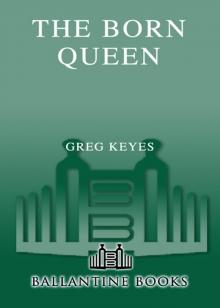 The Born Queen
The Born Queen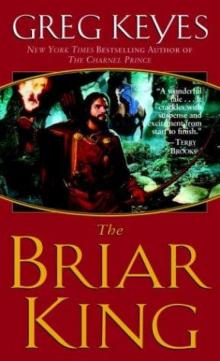 The Briar King
The Briar King Star Wars The New Jedi Order - Dark Journey - Book 10
Star Wars The New Jedi Order - Dark Journey - Book 10 Star Wars: New Jedi Order Book 8b: Emissary of the Void
Star Wars: New Jedi Order Book 8b: Emissary of the Void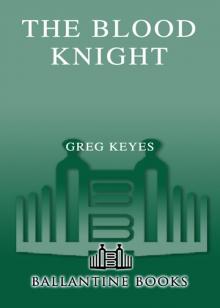 The Blood Knight
The Blood Knight Star Wars - Edge of Victory - Book 1: Conquest
Star Wars - Edge of Victory - Book 1: Conquest Edge of Victory 2 Rebirth
Edge of Victory 2 Rebirth Lord of Souls: An Elder Scrolls Novel
Lord of Souls: An Elder Scrolls Novel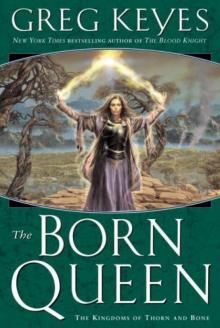 The Born Queen tkotab-4
The Born Queen tkotab-4 Rebirth: Edge of Victory II
Rebirth: Edge of Victory II Conquest: Edge of Victory I
Conquest: Edge of Victory I Emissary of the Void
Emissary of the Void The Blackgod
The Blackgod Star Wars The New Jedi Order - The Final Prophecy - Book 19
Star Wars The New Jedi Order - The Final Prophecy - Book 19 The Infernal City
The Infernal City The Charnel Prince
The Charnel Prince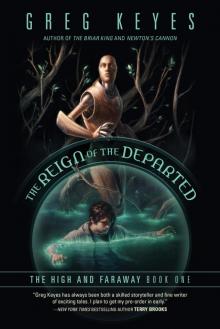 The Reign of the Departed
The Reign of the Departed Lord of Souls es-2
Lord of Souls es-2 Chosen of the Changeling
Chosen of the Changeling Dawn of the Planet of the Apes
Dawn of the Planet of the Apes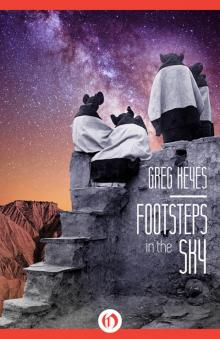 Footsteps in the Sky
Footsteps in the Sky PACIFIC RIM UPRISING ASCENSION
PACIFIC RIM UPRISING ASCENSION The Final Prophecy: Edge of Victory III
The Final Prophecy: Edge of Victory III